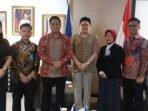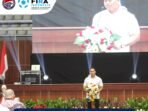Semarang – The Indonesian Ulema Council (MUI) in Central Java reminded the government that the guarantee of halal products is a sharia area that is guarded by ulama.
“The government should understand that halal law is the domain of Islamic law, whose authority is in the hands of the ulama. For this reason, the derivative of this law must refer to the above,” said the General Chairman of the Central Java MUI, Dr KH Ahmad Darodji MSi in the opening ceremony of the Halaqah Ulama with the theme “The Role and Authority of MUI in the Job Creation Law” on Friday-Saturday, October 30-31, 2020, at Hotel Patra Semarang.
In particular, the Central Java MUI issued a recommendation to address the Job Creation Law which was passed on October 5, 2020. The law is considered to have amputated two of the three MUI authorities regarding Halal Product Guarantee (JPH) regulated in Law 33/2014 on JPH.
Halaqah was opened by the Governor of Central Java, Ganjar Pranowo, which was held with a health protocol. The participants were 50 people, consisting of elements from the district/city MUI and Central Java.
Kiai Darodji emphasized that one of the MUI’s obligations is to protect and protect Muslims from consuming and using non-halal products. The passing of the Job Creation Law, which reduces the substance of halal as a matter of licensing and administration, creates the government’s responsibility to protect and protect Muslims from consuming and using products that are not halal. This responsibility must never stop and be forgotten.
Halaqoh presented speakers, namely the Director of the Central MUI Food, Drug and Cosmetics Study Institute (LPPOM), Dr Lukmanul Hakim, Deputy Chairperson of the Central Java MUI and Director of the Central Java MUI LPPOM, Prof Dr H Ahmad Rofiq MA, Secretary of the MUI Fatwa Commission Central Java, Dr KH Fadlolan Musyafak Lc MA. Then the Central Java MUI Law Commission, Prof Dr KH Abu Rokhmad MAg and the General Secretary of MUI Central Java Drs KH Muhyiddin MAg.
According to Kiai Darodji, this recommendation contains three points for the public to know. The rest, will issue recommendations that are technically substantial regarding the guarantee of halal products as input to the government so that in drafting regulations under the Job Creation Law it does not deviate from Islamic law.
Central Java Governor Ganjar Pranowo in his remarks welcomed this halaqah as a method of providing input regarding the Job Creation Law. Meanwhile, in many places expressing through demonstrations there are even those who are eager to overthrow the government.
As Governor, Ganjar promised to fulfill the expectations of the Central Java MUI to encourage the central government to heed these recommendations. “In responding to the Job Creation Law, many are impatient and do not organize themselves. Most of the demonstrators had not read the full article by article but were already shouting loudly and were even ridden with hoax issues,” he said.
The governor asked halaqah to clearly review the Job Creation Law related to JPH, so that the conduciveness of the people is maintained considering that many people still do not understand. “This way of communication like halaqah is important in creating conducivity in society,” he added.
In essence, in Law 33/2014 there are three authorities of MUI in the JPH regulations, namely halal determination, halal auditor certification, and accreditation of the Halal Examination Agency (LPH). Of the three powers that are still maintained in the Job Creation Law, only the authority in determining halal is left.
If the MUI’s authority is limited to stipulating halal, then it is assumed that this authority is limited to administrative licensing, not a substance to ensure the halalness of products according to Islamic law. It is feared that the streamlining of authority will cause the guarantee of halal products to be neglected, which will lead to distrust of Muslims in halal certification. (Aska)











